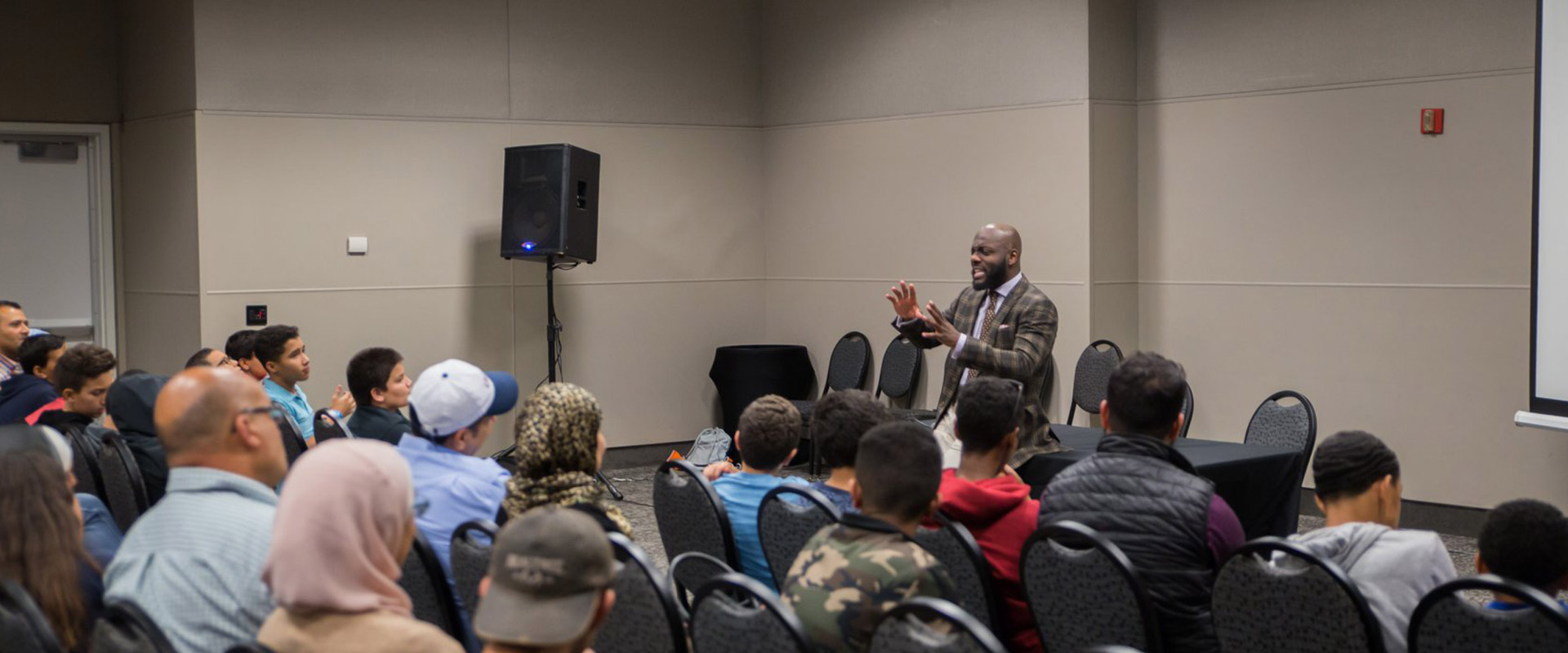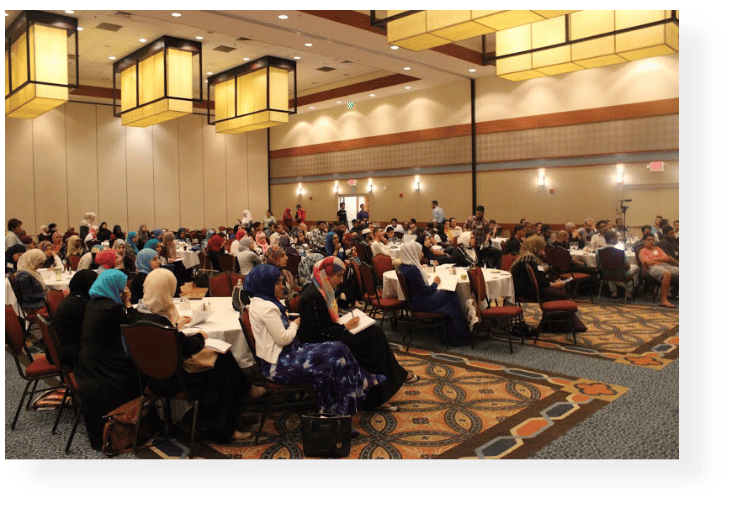MAS Tarbiya Mentorship Development Program
The goal of this program is to develop a solid platform of qualified Tarbiya mentors who are able to inspire new generations of Muslim activists.

Introduction
This program is for MAS members who are preparing to lead an Usra (study circle for self-development and Islamic education). It aims to develop mentors who will lead the Tarbiya (Islamic personal development) function in MAS. The program is run by senior MAS Tarbiya mentors and will take place over a full year with an (optional) additional 6 months of personal coaching. Over the course of the year, participants will be exposed to didactic lectures and presentations, interactive discussions, and be required to complete practical assignments.
Why Tarbiya Mentor Development?
To establish a sustainable system of producing qualified Tarbiya mentors who have the spiritual connection, self-discipline, intellectual foundation, the required skills and the internal drive to mentor new members to carry the message in its authentic format. The mentors’ mission is to sustain the organization’s value system, to be able to act under challenging circumstances and adapt to external changes.


What is the Tarbiya Mentor Development Program?
This program develops the character of the Tarbiya mentors and equips them with:
- A sustainable spiritual connection with The Creator
- Strong sense of self-discipline and self-drive characteristics
- Basic knowledge of foundational Islamic concepts of the Quran, Hadeeth, Seerah, Tazkiya and contemporary matters
- Deep understanding of MAS Tarbiya objectives and Usra management strategies
- Mentorship and coaching skills including communication skills, emotional intelligence, personal counselling, social psychology, organization skills, and more
Tarbiya Mentor Development Project
We will be offering two versions of the Mentor Development Project to serve MAS members at different stages of their journey.
The Mentor Development Program offers a Structured Usra Program (SUP) as well as individual registration. It is a two-year program designed for MAS members or those who have been in a MAS Usra for more than two years.
Participants may join as a whole Usra together. If they are from areas where there is no MAS chapter, they may join individually, and they will be assigned to a virtual Usra. Participants will meet all together once a week to attend a virtual session, then split into their own groups to continue the rest of their meeting where they will follow instructions manual developed specifically for this program. The first part will focus on developing spiritual connection with the Creator, disciplined and driven personality, and learn the essential foundations of Islam. This will be done while building brotherhood/sisterhood among participants, study and practice the 5 MAS tarbiyah qualities, and explore different da’wa venues to pursue. Successful graduates will join the second part where Tarbiyah mentorship will be introduced focusing on acquisition of essential mentorship skills such as personal coaching, counseling, behavior modification, Usra management, and tarbiyah planning and monitoring through hands-on practical modules.
Registration Open for January Start Date | Wednesdays 8:30pm ET on Zoom
Program Main Features
3. Solid Intellectual Background
This feature involves the educational modules to build intellectual foundations needed for the tarbiya mentors focusing on thematic study of the Quran, Seerah, Hadeeth, and contemporary matters:
- Science of the Quran: the focus will be on how to understand a Surah and extract Tarbiyah lessons from it within its context.
- Seerah (biography of the Prophet): rather than chronological ‘go through’ study, the program will focus on thematic discussion of concepts such as the Prophet (s) as a role model, how the Prophet (s) instilled faith (creed) in the hearts of his companions and the belief that the prize is ultimately “Al-Jannah” (the paradise), when the divine guidance drove historic events, and when it led the Prophet (s) to improvise, etc.
- Hadeeth: the program will focus on studying groups of Hadeeths each session from Imam Nawawi’s book covering a common theme such as faith, servanthood, straightness (steadfastness), sources of guidance, etc.
- Contemporary matters essential to the Tarbiya mentor: such as atheism, science and faith, interfaith distinctions, gender issues, etc.


4. Understanding the Movement
- This involves examining samples of successful reformative movements.
- Studying schools of thought in traditional and contemporary Islamic movements
- Impact of modern and contemporary life development on Dawah and Tarbiya
5. Mentorship and Coaching Skills
This feature includes the following:
- Enhancing Emotional Intelligence
- My Emotional State, Self Awareness, Emotional Awareness, Emotional Impact and Compassionate Communication
- Transtheoretical models: Mastering Habits & Creating Lasting Change
- Eliminate bad habits and create empowering habits
- Essentials of counselling
- Micro counselling (individual approach) and Macro counseling (group approach)
6. Essentials of Tarbiyah Objectives in MAS, Training on Usra Management Skills, and MAS Tarbiya Curriculum
This feature will discuss concepts of managing Usra including the objectives of the Usra, role and duties of the Tarbiya mentor, Usra dynamics, getting members engaged, the Tarbiya Program and sample of Usra meeting, and finally practical challenges and cases from the real world.

FAQs
Who should join this program?
- Current Tarbiya mentors who aspire to refresh their knowledge, mentorship skills, and commitment to Tarbiya in MAS
- MAS members who plan to take part in the Tarbiya process as future Tarbiya mentors
- Anyone who wants to revive their personal commitment to self-driven Dawah and Tarbiya
MAS chapters (and individual members) can apply. Acceptance will be based on individual experience with the MAS Tarbiya process, years in MAS Usra, and interest and commitment in the application. Other factors will cater to diversity in gender, race/ethnicity, geographical distribution, strength of chapter, and so on.
What does the curriculum look like?
What is required of participants while in the program?
- Attend the weekly program
- No unexcused absence is allowed
- Up to 10 % of the program activities in excused absences may be allowed
- Fully engage in the discussions and group activities
- Prepare required readings and homework
- Follow instructions on the personal activity follow up
What will mentors gain by going through the program?
Graduates of the Tarbiya Mentors Development Program will be able to:
- Sustain a daily connection with the creator through qiyam, Quran and dhikr
- Drive a self-disciplined Dawah life focused on developing self and others
- Be able to establish deep connections with their mentees
- Have the proper understanding of the Tarbiya process and skills to deeply connect with Usra members and achieve Usra dynamics
- Have the skills to influence, mentor and coach Usra members to be their best
- Understand and deliver basic Islamic concepts to their mentees
Where will the program be held?
The MDP is virtual and will be hosted online.
When will the program start and end?
The program will start January 2022 and conclude in December 2022.
Classes will be held on Wednesdays, for 3 hours, 8-11pm EST.
Additional small groups interactions (1-1.5h) will be held as needed at each group’s convenience.
- Jan 1 – 15
- Apr 15 – May 15
- Jul 1 – 15
- Nov 20 – 27
- Dec 16 – Dec 31
This is to accommodate up to two more planned cancellations according to the needs of the participants as a group and three more unplanned cancellations due to unforeseen circumstances.
How long are classes?
Please be prepared to commit three hours to class time weekly and another 2-3 hours for course work outside of class.
What is the cost?
How To Apply
Interested members need to apply online and fill the online application form below.
